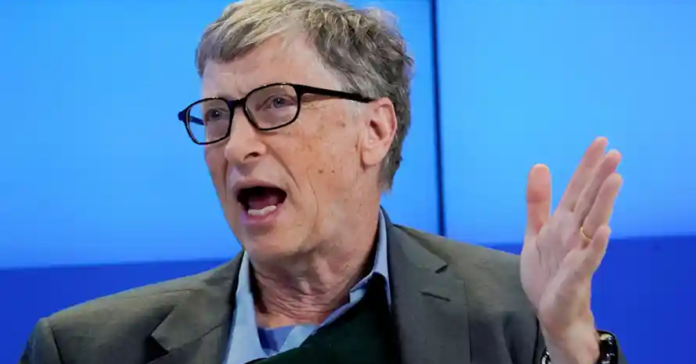After spending several weeks trying to get a well-sourced article published about Bill Gates, the second richest man in the world, I have come to conclude that conservatives and liberals in the media treat him with kid gloves—even while whispering about him behind his back. I am beginning to think they are afraid of offending a globalist on a mission.
The renowned software developer has carved out a role for himself as a humanitarian’s humanitarian, financing projects and people with a magnitude that astonishes people. After all, he does have a big reach for a Harvard University dropout People will tell you privately he worries them. I have never met Bill Gates, but he strikes me as a secular humanist on a superhero mission. Gates seems to believe that his vision, wealth, and power can save the world from imminent destruction.
Bill Gates has been engaged in everything from education reform to pandemic predictions to vaccine investments, to the acquisition of millions of acres of farmland, and his latest plan to replace beef with lab-grown meat. All of these ventures tie back to his primary plan to protect the environment. Gates has indicated in the past he believes the world needs fewer people consuming its resources. He is a man on a mission to stop global warming using whatever it takes.
Climate change and global warming have been on Gate’s mind for decades. He is determined to get to zero greenhouse gas emissions. A couple of months ago, he released a 272-page book titled How to Avoid a Climate Disaster. Reminiscent of Sir Arthur Conan Doyle’s dog that didn’t bark, he made no reference to population reduction and only a passing mention of population growth (p. 40). He does devote significant attention to reducing carbon emissions that came about during the coronavirus shutdowns, even while admitting that the disease and lockdowns have been costly in terms of human lives and livelihoods.
Despite his newfound silence on the issue, Gates has expressed an interest in population reduction in the past. He has proposed it previously as a means of reducing carbon emissions to zero by 2050. In a 2010 TED Talk, Gates presented an equation that focused on humans, the services we use, and their energy requirements as the main factors for CO2 output. He told the audience that the top scientists agreed that CO2 would need to reach zero to avoid catastrophe. The unspoken conclusion there would appear to have something to do with reducing the population since the other factors all relate to the number of people on Earth.
“First, we’ve got population. The world today has 6.8 billion people. That’s headed up to about nine billion. If we do a really great job on new vaccines, health care, reproductive health services, we could lower that by perhaps 10 or 15 percent. But there, we see an increase of about 1.3.”
Because Gates never says depopulation in his speeches outright, the “fact-checkers” have ridiculed and dismissed his critics as conspiracy theorists. On numerous occasions, Gates has alluded to population reduction—as evidenced by his own words in the 2010 Ted Talk. He has had a long-term interest in pandemics; he has noted that they can kill as many as 10 million people. In 2015, he predicted that we would likely experience a similar death toll from an influenza virus in the next twenty years. Gates’s prediction came true, five years later, in the form of COVID-19.
How much guesswork was in that prediction, really? In October 2019, Gates participated in and helped fund Event 201, a pandemic preparedness exercise with Johns Hopkins University. The official response from USA Today “fact-checkers” is that Gates’s October 2019 Pandemic Simulation had NOTHING to do with COVID-19. Yet, it was Gates’ peers—the Bloomberg Philanthropies and Stavros Niarchos Foundation—that financed the famous Johns Hopkins Tracker that has kept us abreast of the spread of COVID-19. The tracker was up and ready to go just in time for the crisis.
These weren’t novel partnerships, either. They have history. The Gates Foundation and Bloomberg Philanthropies have worked together to achieve their collective goals. On top of that, Gates has given millions to Johns Hopkins University. In 2003, his foundation gave $40 million to the Bill and Melinda Gates Institute for Population and Reproductive Health.
Gates has shadowed the coronavirus outbreak in other ways. Recently, he was listed as the second major donor to the World Health Organization (WHO). And it was WHO that failed to warn the world about what had happened in Wuhan, China, during the initial outbreak of the virus. What many experts saw as a derelict of duties led President Trump to pull support from the organization.
Protecting us from global warming’s ill effects is another big concern for Gates. One of his more bizarre ventures is his investment in a project that hopes to reduce the sun’s power. He is funding Harvard University research called the Stratospheric Controlled Perturbation Experiment, or SCoPEx, which would spray a chalk compound into the atmosphere to reflect some of the sun’s rays away. The SCoPEx team claimed that the project wouldn’t pose any “significant hazard” to people or the environment.
However, scientists immediately voiced concerns that this experiment could result in extreme weather changes, such as worsening climate warming trends. Gates has had little to say to skeptics who warn that tampering with the sun could have dire consequences. The backlash didn’t go unheeded, however. Just last week, SCoPEx researchers announced that they were suspending the experiment indefinitely. They didn’t admit that it was because of public concern about the dangers posed by SCoPEx. Instead, their advisory committee claimed that they wanted to wait to obtain input from indigenous populations.
Although Bill Gates’ tentacles reach across the globe, they have their roots closer to home. He exerts enormous influence on governmental agencies who depend on private philanthropy with the power to enrich individual scientists.
Gates’s interests in reproduction and vaccines have been reflected in millions of dollars donated to the CDC, NIH, NIAID, and a litany of major research universities, think tanks, pharmaceutical, and drug testing companies. Gates is dangerous because people and agencies can be bought, especially if they have a secular worldview that believes the ends justify the means. The progressive left is willing to follow Gates’s lead because they are convinced that the planet will be destroyed unless they act now, and that will be the end of humanity. Christians and orthodox Jews believe we should be good stewards of this world, but we reject the view that the planet’s survival lies in human hands alone.
Gates’ latest interest in forcing wealthier nations to eat lab-grown beef to reduce carbon emissions from cows is the latest manifestation of his efforts to save the earth. As with the atmospheric screen, there are serious problems posed by that ambition. The safety of the growth hormones and toxicity levels from plastic exposure – not to mention the nutritional composition quality – is doubtful.
And yet, despite those dangers, Gates only pushes his agenda harder while the rest of us either ignore him or we make excuses for his behavior. Presently, there seems to be a huge public relations campaign to debunk criticisms of him. I would not be surprised to see him run for president someday. Bill and Melinda Gates may present a neat picture of good intentions for the world, but we know the road to hell is paved with such. My concern is we have not held him accountable for his investments and the charitable contributions he makes to organizations where he is already a major investor. Nor has the Gates Foundation been held accountable for the reported harms done to human subjects by pharmaceutical trials his organization funded in poor nations such as India and Sub Saharan Africa.
These are a few of the alarming patterns of Bill Gates. They serve as a grave portent of what we may face as we allow these agendas to forge on, unchecked. To me, however, the most alarming thing about all of this does not have to do with Gates himself—it’s the people who are too afraid to even doubt him.







